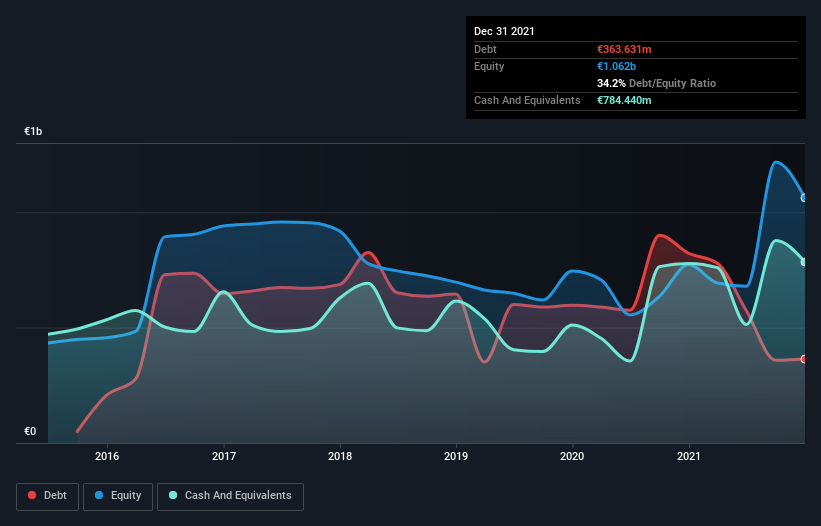
Warren Buffett famously said, 'Volatility is far from synonymous with risk.' So it seems the smart money knows that debt - which is usually involved in bankruptcies - is a very important factor, when you assess how risky a company is. We can see that Nordex SE (ETR:NDX1) does use debt in its business. But should shareholders be worried about its use of debt?
When Is Debt Dangerous?
Generally speaking, debt only becomes a real problem when a company can't easily pay it off, either by raising capital or with its own cash flow. Part and parcel of capitalism is the process of 'creative destruction' where failed businesses are mercilessly liquidated by their bankers. While that is not too common, we often do see indebted companies permanently diluting shareholders because lenders force them to raise capital at a distressed price. Of course, debt can be an important tool in businesses, particularly capital heavy businesses. The first thing to do when considering how much debt a business uses is to look at its cash and debt together.
Check out our latest analysis for Nordex
How Much Debt Does Nordex Carry?
You can click the graphic below for the historical numbers, but it shows that Nordex had €363.6m of debt in December 2021, down from €822.3m, one year before. But it also has €784.4m in cash to offset that, meaning it has €420.8m net cash.

How Healthy Is Nordex's Balance Sheet?
The latest balance sheet data shows that Nordex had liabilities of €2.33b due within a year, and liabilities of €715.7m falling due after that. Offsetting this, it had €784.4m in cash and €944.6m in receivables that were due within 12 months. So it has liabilities totalling €1.32b more than its cash and near-term receivables, combined.
This is a mountain of leverage relative to its market capitalization of €1.65b. Should its lenders demand that it shore up the balance sheet, shareholders would likely face severe dilution. Despite its noteworthy liabilities, Nordex boasts net cash, so it's fair to say it does not have a heavy debt load! There's no doubt that we learn most about debt from the balance sheet. But ultimately the future profitability of the business will decide if Nordex can strengthen its balance sheet over time. So if you want to see what the professionals think, you might find this free report on analyst profit forecasts to be interesting.
In the last year Nordex wasn't profitable at an EBIT level, but managed to grow its revenue by 17%, to €5.4b. We usually like to see faster growth from unprofitable companies, but each to their own.
So How Risky Is Nordex?
We have no doubt that loss making companies are, in general, riskier than profitable ones. And we do note that Nordex had an earnings before interest and tax (EBIT) loss, over the last year. And over the same period it saw negative free cash outflow of €42m and booked a €230m accounting loss. While this does make the company a bit risky, it's important to remember it has net cash of €420.8m. That means it could keep spending at its current rate for more than two years. Overall, we'd say the stock is a bit risky, and we're usually very cautious until we see positive free cash flow. There's no doubt that we learn most about debt from the balance sheet. But ultimately, every company can contain risks that exist outside of the balance sheet. To that end, you should be aware of the 2 warning signs we've spotted with Nordex .
When all is said and done, sometimes its easier to focus on companies that don't even need debt. Readers can access a list of growth stocks with zero net debt 100% free, right now.
Valuation is complex, but we're here to simplify it.
Discover if Nordex might be undervalued or overvalued with our detailed analysis, featuring fair value estimates, potential risks, dividends, insider trades, and its financial condition.
Access Free AnalysisHave feedback on this article? Concerned about the content? Get in touch with us directly. Alternatively, email editorial-team (at) simplywallst.com.
This article by Simply Wall St is general in nature. We provide commentary based on historical data and analyst forecasts only using an unbiased methodology and our articles are not intended to be financial advice. It does not constitute a recommendation to buy or sell any stock, and does not take account of your objectives, or your financial situation. We aim to bring you long-term focused analysis driven by fundamental data. Note that our analysis may not factor in the latest price-sensitive company announcements or qualitative material. Simply Wall St has no position in any stocks mentioned.
About XTRA:NDX1
Nordex
Develops, manufactures, and distributes multi-megawatt onshore wind turbines worldwide.
Excellent balance sheet with moderate growth potential.
Similar Companies
Market Insights
Community Narratives



